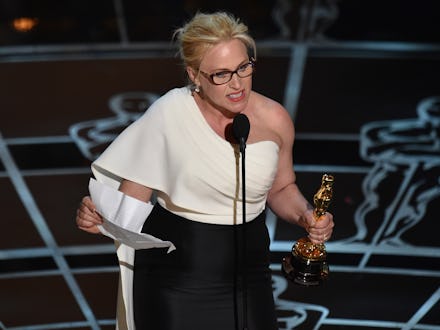Patricia Arquette's Oscars Speech Reveals a Big Problem with White Feminism

Patricia Arquette had Meryl Streep whooping after her seemingly perfect acceptance speech at last night's Academy Awards. Her call for equal pay for women, as she accepted the best supporting actress Oscar for Boyhood, was rapturously received by the audience — and, as one might expect, by Twitter.
The speech was immediately codified as a righteous feminist statement, and understandably so. When someone uses his or her Oscar speech to call for equal rights, it will always invite cheers. However, the statement itself was quickly dissected, with one sentiment coming under intense scrutiny:
"To every woman who gave birth, to every taxpayer and citizen of this nation, we have fought for everybody else's equal rights. It's our time to have wage equality once and for all and equal rights for women in the United States of America."
Our bolding emphasizes the flaw in Arquette's speech, which several Twitter users caught on to last night:
Arquette's choice of phrasing — "we have fought for everybody else" — was quickly inferred as a statement that now is the time for all groups to focus on women's rights. It was a sentiment she doubled down on backstage in her press room interview (emphasis ours):
"Equal means equal. The truth of it is, the older an actress gets, the less money she makes. It's inexcusable that we talk about equal rights for women in other countries, and yet ... we don't have equal rights for women in America. It's time for all the women in America and all the men who love women and all the gay people and all the people of color that we've fought for to fight for us now."
There are myriad issues with this line of reasoning. Why must each group be so quickly divided away from the others? What of women of color or queer women?
Arquette's phrasing gives the impression that each of these groups is separate and that women's rights have gotten the shaft while we focus on other people's needs. It's hard to see the truth in that; while some white, straight, cis women have been supportive of people of color and gay men and women in the past, others have not. It's not an established or consistent pattern, further proving that such clean categorization without allowing for intersectionality just doesn't work.
Arquette isn't the first to indicate a need for greater support of women's rights from minority groups. Actress Rose McGowan attracted a swift backlash for comments she made last November, when she said she thought gay men were "misogynistic" — even more so than straight men.
"You wanna talk about the fact that I have heard nobody in the gay community, no gay males, standing up for women on any level?" McGowan said in a conversation with author Bret Easton Ellis. "Women, by and large, have very much helped the gay community get to where they are today."
On Twitter Monday morning, Arquette attempted to explain her position further. The results, judging from responses, were mixed:
Arquette's comments are not the first of their kind — and hopefully they'll inspire further dialogue about intersectionality as it relates to feminism. But Arquette's message of feminism, for now, remains muddled.